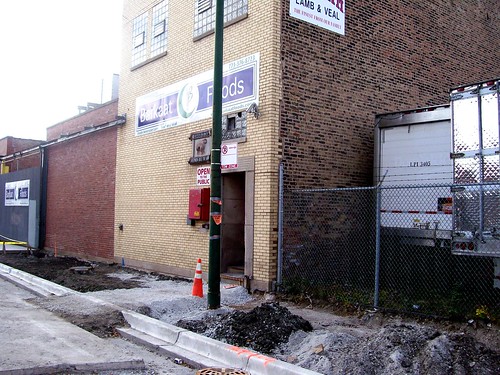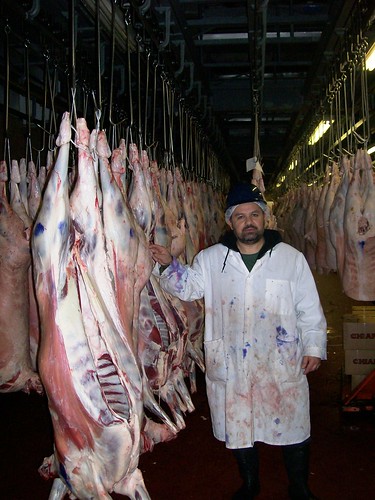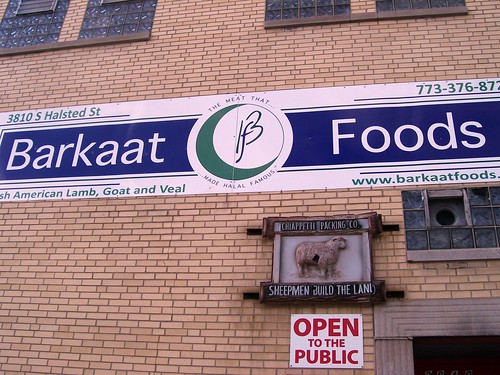
Ideally, the new sidewalks in front of 3810 South Halsted would have been finished last week, because this week, throngs of faithful Muslims are celebrating the festival of Eid by making a trip to Barkaat Foods. Barkaat has replaced Chiapetti’s as the last slaughterhouse in Chicago. They specialize in halal meat, slaughtered in accordance with dietary laws of Islam.
Eid marks the occasion when God told Abraham to sacrifice a ram in Isaac’s stead, and Barkaat is expecting about 500 customers who will honor the event by slaughtering their own lamb for the holiday feast. Ahmed Khan, Barkaat’s President and CEO, says that most of them have scheduled their slot ahead of time, and a professional butcher is on hand to oversee each slaughter, but logistics still sound complex.
Barkaat opened for business in the last week of October last year -- just in time for the busiest week of a halal butcher’s year. “We learned a lot,” Khan smiles.
Khan and his business partner Salman Khan were IT consultants before they opened Barkaat Foods. They still operate their IT business, UIS Consulting, whose clients include the Chicago Public Schools and Harris Bank. The leap from cyberspace to slaughterhouse is unusual. But Khan, who got his MBA at Northwestern’s Kellogg School, says they were always being told to look for a “niche” in business school.
The US market in halal foods has 2 characteristics of a perfect niche – it’s both underserved and potentially huge. Demographically, Muslims are a youthful, growing population. A study by advertising agency JWT estimates the US halal market to be worth $170 billion; it’s worth $2 trillion worldwide. Internationally, big firms like Nestle and Carrefour have developed specialty product lines for Muslim consumers. By contrast, the US market is still relatively immature. There are fewer halal products, and in a meat industry dominated by beef and pork, Khan says only 4 of the big US slaughterhouses regularly slaughter lamb and goat at all. “It’s a phenomenal opportunity,” Khan says.
Khan first came across the Chiapetti’s facility 5 years ago. At the time, Chiapetti’s was the last of the old guard of Chicago slaughterhouses that once proliferated around the Union Stockyards. Originally, the stockyards grew around the rail hub that gave them ready access to every market in the United States. But a central city location made less sense as refrigerated trucks and the highway system replaced rail cars as the primary mode of meat transport, and the stockyards closed for good in 1971.
Chiappetti’s persisted by cultivating niche markets. They specialized in lamb and veal for restaurants and other food service businesses, and offered both kosher and halal slaughtered meat. Franco Chiappetti once joked with a reporter that his operation illustrated the potential for world peace, because Muslims, Christians and Jews worked side by side with knives, and no one was stabbing each other.
But Chiappetti’s was also concerned as $500,000 homes were being built closer to their plant. They had seen what happened at the meat market on Fulton Street as residential lofts moved in, and 5 years ago, they were already looking around for a more modern facility. By spring of 2009, when Khan visited Chiappetti’s again, they were still at the South Halsted plant, but they had outsourced slaughter operations and were processing meat shipped in from Iowa.
“The price was acceptable” for the former Chiappetti’s plant Khan says, and so was the location. In fact, the central city address that turned into an inconvenience for other slaughterhouses is an advantage to Barkaat’s business. “Authenticity is very important,” Khan says, and customers often want to visit the plant.
The facility itself is compact, the disassembly line is relatively simple, but the rules governing it are complex. USDA inspectors make sure it is clean; the rules of dhabiya, or halal slaughter, are humane.

USDA inspectors make the rounds of 4 or 5 meat facilities in the area every day. They inspect each live animal for disease so they can track problems back to the farm they came from, and they inspect each carcass after the kill, removing parts that aren’t up to snuff. Innards are disposed by a specialty waste handler; fleeces make their way to a tanner just south of the railroad tracks.
The walls and floor are washed down with hoses – the process takes 4 hours after each kill. The blood and water are flushed through drains in the floor and pumped to a rooftop treatment system. The water department measures the waste content of water entering the sewers and charges Barkaat for whatever hasn’t been removed.
Barkaat’s biggest single customer is Strauss Brands, a Franklin, Wisconsin based purveyor of lamb and veal which has made a name of itself producing free raised animals, which graze in pastures with their mothers, rather than being confined to crates, or held on tethers. “Our secret is authenticity,” Strauss advertises.
After each slaughter, most of the meat is shipped to Strauss’ Wisconsin facility for further processing, and sold under the Strauss label. In Chicago, you can buy Strauss brands, which may have been slaughtered at Barkaat, through Whole Foods, and through Caputo’s Fresh Markets. It’s also available through Costco online.
Khan says Barkaat slaughters about 2,500 animals a week -- roughly 2,000 of them lambs and another 500 goats – and the company is growing. He expects to slaughter 1,500 lambs this week for Eid in addition to their regular volume. They also slaughter kosher meat on Mondays, and they are developing prepared products – meat patties and the like. Most of the testing is done at another facility at 92nd and Baltimore, but Barkaat’s 2nd floor offices on Halsted are aromatic with spices from test product.
Barkaat employs 25 workers outside of management – some of them worked for Chiappetti’s for decades before Barkaat arrived. They lend Barkaat a connection to Chicago’s old tradition of meat packing, as Barkaat gives Bridgeport’s meat district a foothold in a new niche with phenomenal potential.

Wow that's a lot of lamb and goat ghosts....
ReplyDelete"Christians and Jews worked side by side with knives, and no one was stabbing each other."
ReplyDeleteAt least intentionally, it being the meat packing and all...
Great post, Kristin!
PLEASE PARDON THAT LAMB THAT TRIED TO ESCAPE SATURDAY IN THE NAME OF GOD ...... PLEASE DO NOT KILL HIM !
ReplyDelete